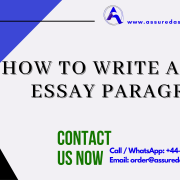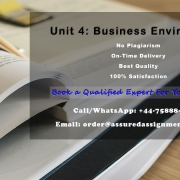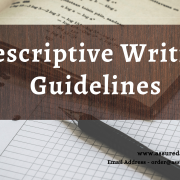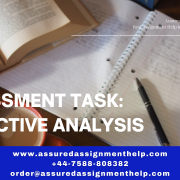Task description:
This assessment represents the culmination of the term-long project work completed in this course. It involves presentation of a full report which will include
• An outline of the research project and the strategy adopted to complete it (this will be derived largely from the content of assessment 1 and developed from it)
• A literature review and conceptual framework (this will be derived largely from the content of assessment 2 and developed from it)
• Presentation of the particularities relevant to the topic question based on literature specific to the topic problem and/or data derived from field study.
• Analysis and assessment of the project problem in the light of the conceptual framework and incorporating analysis of specific case/topic.
• Discussion the key findings of the project with limitations of project and directions for future research
• Conclusions of the project
Each of the above may be a separate chapter, or major heading in the final report. The final report should read as a complete argument suitable for a non-specialist reader, but leading to a useful conclusion that would be of some interest to its disciplinary area. It should communicate mastery of those aspects of the existing body of knowledge pertinent to the topic presented in a manner that presents a useful conclusion to the reader. Better submissions will display suitability to be reframed as publishable papers in terms of their
presentation style and intellectual content.
Assessment criteria:
Your report will be graded according to its overall quality on the following criteria:
1. presentation, structure, grammar, style, clarity of expression and brevity
2. effectiveness of problem outline and presentation of research strategy
3. extent of literature considered and effectiveness of its review
4. effectiveness of conceptual framework
5. quality of analysis of field data and information
6. strength of structured argument answering the research problem
7. originality and insight
Task description:
Assessment 2 requires the preparation of a paper showing progress made on your project. It will focus on a draft literature review. It will also generally outline your progress in the overall project proposed in assessment item 1 up until the due date of this assessment. The
draft literature review and draft conceptual framework will both be refined and completed following this assessment and in their final form they will likely provide the second chapter of your final project report.
The paper should include:
• The progress made in terms of the collection of the literature relevant to the research topic.
• A literature review of the reading completed to date (see below).
• An assessment of field data and literature particular to the topic. This will set out what has been found and also provide direction as to what additional material will be required to complete the project.
• An indication of progress with respect to the major milestones identified in Assessment 1 (please attach copy of your timeline).
• Discussion of the remaining stages to be undertaken to secure the successful completion of the project.
The literature review:
The literature review should review all the literature read to date (e.g. articles, books, reports etc) relevant to the research topic. This analysis requires a discussion of the relevance to the research topic of the primary and secondary sources you have obtained so
far. This will be the draft literature to be augmented for inclusion in its final form in the final report.
Ideally the literature should be organised as a coherent presentation of ideas with copious references to the literature sources. It should include consideration of literature that has been read in connection with the project but found irrelevant. It may include general
theoretical background (shown to be relevant to the topic), literature on method, and literature specific to the topic area itself.
There are two common styles for literature reviews as follows:
1) A presentation of each item with a summary/abstract and comments. This reads like a series of mini-reviews.
2) A presentation of the ideas found in the literature laid out in a systematic way suitable to informing the research topic with copious references to the literature (citations and quotes, including all sides of controversial issues and also those lines of thought that have been
found to be not directly relevant to the topic at hand). This reads more like a very heavily referenced mini-essay that covers many ideas, but without any particular conclusion. In addition to displaying what has been found in the literature, this format provides a
conceptual framework for the topic. Of these two, the first is a useful starting point for organisation, but only provides an elementary
presentation of contributions of the literature to the topic. The second requires more preparation but provides the reader with a far clearer indication of the intellectual resources available from the literature. It may be written to simultaneously provide a conceptual framework.
The conceptual framework:
The conceptual framework is the theoretical background within which the topic is couched. A draft conceptual framework will provide a structured presentation of the relevant theory as it has been found in the literature. It will illuminate the research problem and provide
direction as to why the topic is important and how the current project will move systematic understanding in the discipline forward. It will take the key elements found in the literature review to show how the current question fits within the accepted body of knowledge. It may
also point to gaps or problems in the current body of knowledge. In larger studies it will form a separate section, but for the purposes of Business Project it may be integrated into the literature survey to form a single section.
Assessment criteria:
Your report will be graded according to its overall quality on the following criteria:
1. presentation, structure, grammar, style, clarity of expression and brevity
2. extent of literature and effectiveness of review
3. quality of analysis of field data and information
4. effectiveness of draft conceptual framework
5. assessment of project progress and completion strategy
6. originality and insight










